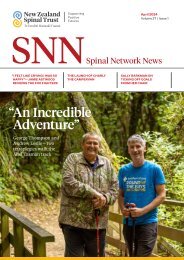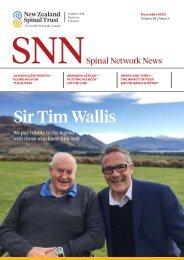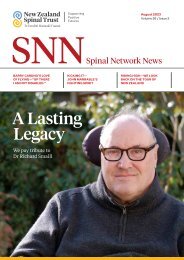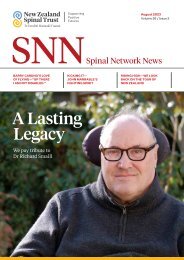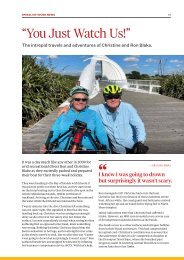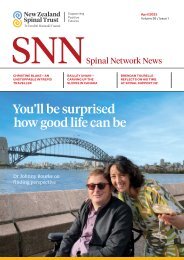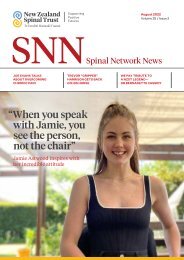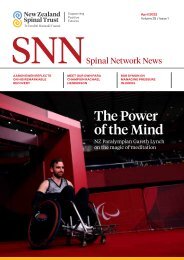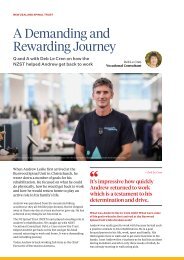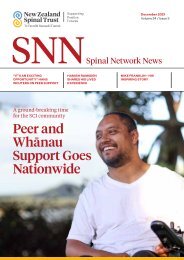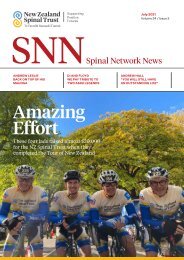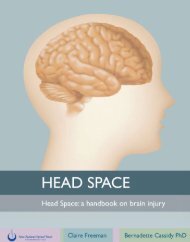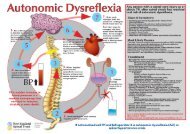SNN_December 2022 Issue_web low res
You also want an ePaper? Increase the reach of your titles
YUMPU automatically turns print PDFs into web optimized ePapers that Google loves.
NEW ZEALAND SPINAL TRUST 24<br />
—Danny Tixier<br />
The reality is it was a huge<br />
wake up call, and reality<br />
check, but I’ve learnt to adjust.<br />
meetings, help them with their shopping, deal with<br />
situations of abuse. We’ve been in court and hospitals.”<br />
While the volume and demand continue to increase at the<br />
Creative Centre, the funding is the same as it was over 20<br />
years ago, says Danny.<br />
It wasn't until my friend first told me that the Creative<br />
Centre provided services and support to people living<br />
with disabilities in the Cook Islands that I realised I<br />
hadn't seen a single person in a wheelchair since I arrived<br />
in Rarotonga during my time there, nor anyone using<br />
crutches, mobility scooters, or any other mobility aids.<br />
Without those visible reminders I had naively thought the<br />
rates of disability were much <strong>low</strong>er in the small Pacific<br />
nation, but Danny quickly corrects me on that fact.<br />
According to the 2016 census, there are 2900 people living<br />
in the Cook Islands with disabilities, a number which is<br />
“huge” comparable to its population of around 17,000, he<br />
adds. “Although we have our numbers [at the centre], we<br />
know this means there are a lot out there who are not<br />
coming in.”<br />
Danny surmises that this could be due to stigma and<br />
shame, preventing people from seeking help. He describes<br />
the traditional beliefs that still prevail in some families,<br />
where a disability is seen as a “curse”.<br />
Other barriers include access, where some will have no<br />
means of transport or are unable to catch the bus on their<br />
own to get them to the Creative Centre.<br />
With an ageing population, the elderly, who may also<br />
benefit from the Creative Centre’s wrap-around services,<br />
are another group who struggle with access, due to<br />
decreasing mobility, and cognitive decline caused by<br />
conditions like dementia.<br />
Loneliness is a big problem, with the lack of social<br />
interaction having huge impact on the elderly especially.<br />
The Cook Islands doesn’t have <strong>res</strong>t homes or retirement<br />
villages, and times are changing, says Danny, with<br />
increasing costs of living pushing people to work more<br />
and be at home less. “This means the mamas are left at<br />
home alone with dementia and so their quality of life and<br />
life expectancy drops.”<br />
He’s experienced a huge lesson in his role and that is, that<br />
as one person, backed with a small team, they can’t be<br />
everywhere at once. The flipside to that coin is seeing the<br />
repercussions when the community’s most vulnerable<br />
aren’t monitored, whether by family or health service.<br />
“The <strong>res</strong>ults are fatal… there are no safety nets here.”<br />
SUPPORT: “Lots of clients rely on us for many things, including<br />
for their mental, physical and social wellbeing.” Danny Tixier.<br />
The need to maintain constant support was paramount<br />
during the COVID-19 pandemic, and the Creative Centre<br />
never closed, working around the clock to keep its<br />
services running for its clients.<br />
He says health services for the 2900 Cook Islanders with<br />
disabilities would benefit from being centralised into a<br />
national service, all under one roof, with shared <strong>res</strong>ources<br />
and pool of funding to make it more sustainable.<br />
With regard to the challenges facing healthcare services<br />
in the Cook Islands, especially NGOs like the Creative<br />
Cente, Danny says there needs to be further investment<br />
across the whole health system, with the aim of making<br />
working in the Cook Islands a more appealing prospect.<br />
“It’s getting people to come back home to take the leap<br />
and work here—it’s really hard, despite the weather and<br />
the beaches.” A lot could be done to make this more<br />
appealing, he adds, saying better wages, better<br />
professional support and care, as well as better<br />
opportunities to train and prog<strong>res</strong>s would be a start.<br />
“We’re not the highest paid people—it takes a certain type<br />
of person to make that jump.” But Danny is certainly that<br />
type of person. On the day of our interview (27 June), it is<br />
exactly three years that he made the move to Rarotonga<br />
with his family. Health care hadn’t always been his<br />
thing—he had spent the majority of the 1990s and 2000s,<br />
running nightclubs across New Zealand and Australia.<br />
But after discovering his passion for helping people, he<br />
returned to New Zealand, where he ran an intensive care<br />
support service for older people. He took a pay cut to do<br />
so, but he was just grateful he was able to give back to his<br />
community.<br />
The Creative Centre saw him take an even bigger pay cut.<br />
“I have to work twice as hard here. I went from having a<br />
human <strong>res</strong>ources team, nurses, lawyers, to here, where I<br />
am everything.<br />
“The reality is it was a huge wake up call, and reality<br />
check, but I’ve learnt to adjust. I’ve enjoyed it and it’s been<br />
hugely rewarding.”



